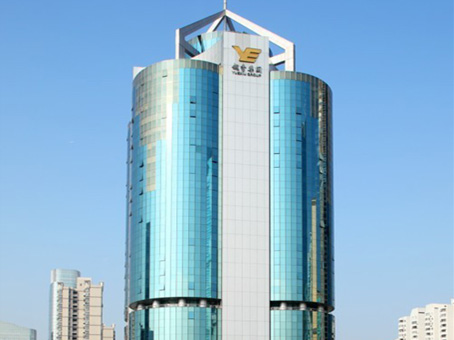
[Updated Oct 2020] A guide to serviced offices and office space for rent in Guangzhou as well as general information that may be useful if you are considering renting office space in the city.
For further Guangzhou offices information or to search office space for rent in Guangzhou just click. Or contact us for any office space search query.
History & Geography
Guangzhou is the largest city in southern China and one of the most economically dynamic cities in the world. Formerly known as Canton, the city is located in the south of Guangdong province on the Pearl River Delta next to Baiyun Mountain. To the front of the city lies the South China Sea and to the back mountainous terrain. Guangzhou then referred to as Panyu, became a provincial capital in 111 BC when it was annexed by the Han Dynasty. By the year 226 AD Panyu was the seat of the Guangzhou Prefecture, and eventually, the city was simply referred to by this name. The city became an important port during the 8th century, engaging in trade with Arab merchants. Guangzhou also had a thriving shipbuilding industry during this time. The first Europeans to arrive in the city were Portuguese merchants in 1514. In the subsequent centuries, more European traders arrived and soon started referring to the port as ‘Canton’, resulting from their confused pronunciation of Guangdong. Before long the port was the busiest trading port in China with ships from all over Europe plying their trade there. The British captured the port during the First Opium War in 1839. Soon after however they ceded it to China and colonized Hong Kong to use as their trading base. In 1938 Japanese troops occupied Guangzhou, not being expelled until the end of WWII in 1945. During the Chinese Civil War Guangzhou was occupied by Nationalist forces until 1949 when Communist forces relieved the city. In the 1970s Guangzhou was the focus of major infrastructure and housing development. Later many factories moved to the area as manufacturing grew more expensive in Hong Kong. Today the city is a manufacturing and commercial hub with a population of almost 13 million people.
Economy
Currently, Guangzhou is the largest manufacturing hub in China with a GDP of USD 133.5 billion. The city is one of the most densely urbanized regions on earth and is a major driver of the country’s economy. In 1984 the Guangzhou Economic and Technological Development Zone was established. Consisting of 17 square kilometres, the zone contains six major industries, electric machinery, foodstuffs, metallurgy and metal fabricating, chemical materials and electronic equipment. In 1992 the Guangzhou Free Trade Zone was established and many major industries moved to the zone, including computer software, logistics and international trade. The latest zone to be established was the Guangzhou Nansha Export Processing Zone. Founded in 2005, the zone was designed to boost the industries of biotechnology, heavy industry and car manufacturing. Guangzhou also hosts the China Import and Export Fair every year. The fair is a major event which brings visitors from around the globe. It is hosted by the Ministry of Trading and takes place in the city’s cavernous Pazhou Complex. The city is also known as a retail hub and visitors come from all over China to explore its many shopping malls and complexes. Among the largest are the China Plaza and Liwan Plaza, which both have thousands of shops between them.
Culture & Tourism
Guangzhou does not have the thriving tourism industry that the cities of Beijing and Shanghai do. However, as the largest city in southern China, Guangzhou does see thousands of visitors every year. For those that do come to the city, there is no shortage of things to do and see. Among the attractions in Guangzhou is Shamian Island, site of the old British and French concessions. The island features a variety of old houses and public buildings, tree-lined avenues and idyllic cafes. Many visitors also go to the Temple of the Six Banyan Trees, an old Buddhist temple built in the sixth century. Another major architectural site is the Sun Yat-Sen Memorial Hall, honouring the old Nationalist leader. A statue of Sun Yat-Sen adorns the entrance to the hall. For those in search of more modern architecture, the Canton Tower, built in 2009, is the tallest building in China and the fourth-tallest in the world. Tourists can go to the observation deck, which is the highest in the world, for one of the best views of Guangzhou. Guangzhou is known for its pleasant climate which sees hot summers and cool winters where the temperature seldom drops below ten degrees Celsius.
Transportation
Guangzhou is served by the Baiyun International Airport. The airport is very new, only being finished in 2004, and is already the second-busiest in China. The city has four major train stations, Guangzhou Station, Guangzhou East, Guangzhou North, and Guangzhou South. It is very easy to get to Hong Kong from Guangzhou, either by train, ferry or bus. The city itself has a comprehensive bus system used by many residents, as well as a metro and taxi services. Motorcycles are banned in Guangzhou.

Office space for rent in Guangzhou
Guangzhou’s economy has been in the doldrums recently with industrial profits falling sharply and growth also tapering off. The rental of Grade A office space has dropped mainly due to foreign firms trying to tighten their belts. No new supply has entered the market recently and the existing supply has very gradually been eaten up, resulting in a vacancy rate of approximately 12 percent. The average rental price for Grade A office space in the city is currently standing at about RMB 225 per square metre per month, a significant rise on the 2011 price of RMB 200 per square metre per month.
Our office space search, advisory and acquisition services are FREE, always. We are globally regulated by the Royal Institution of Chartered Surveyors (RICS) ensuring the highest standards of commercial property advice and service at all times.
